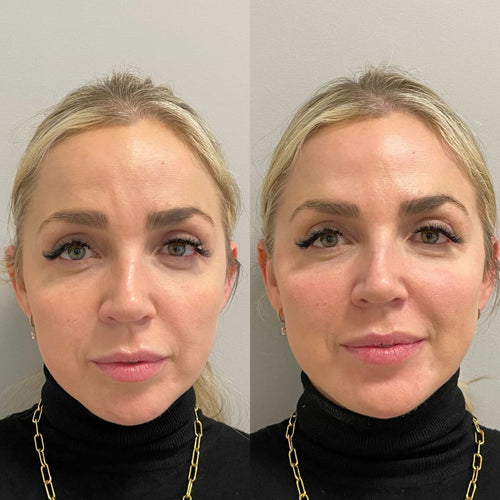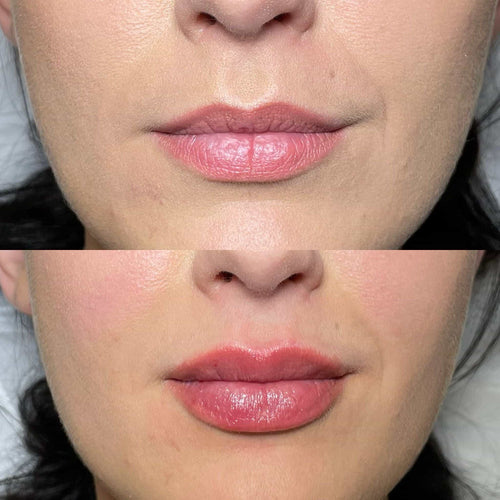Reserve a Dermal Filler Appointment with Dr. Laura Geige Now
Potential Underlying Causes

Allergies
Sinus inflammation, also known as sinusitis, is a common condition that occurs when the tissues lining the sinuses become inflamed and swollen. This can lead to a range of uncomfortable symptoms, such as facial pain, pressure, congestion, and headache.
There are several potential underlying causes of persistent sinus inflammation:
- Viral Infections: The most common cause of sinusitis is a viral infection, such as the common cold or flu. These infections can irritate and inflame the sinuses, leading to congestion and mucus buildup.
- Bacterial Infections: In some cases, a bacterial infection may develop after a viral infection or on its own. Bacteria can multiply in the inflamed sinuses, causing further irritation and swelling.
- Allergies: Allergic reactions to airborne substances, such as pollen, dust mites, mold spores, and pet dander, can trigger sinus inflammation. The allergens stimulate the immune system, which releases chemicals that cause the sinuses to become inflamed and produce excess mucus.
- Structural Problems: Deviations in the nasal septum (the wall that divides the nostrils) or other structural abnormalities in the sinuses can obstruct airflow and create pockets where mucus can accumulate, leading to inflammation.
- Irritants: Exposure to irritants such as smoke, fumes, air pollution, and strong odors can also irritate the sinuses and contribute to inflammation.
- Immune System Dysfunction: Individuals with weakened immune systems, such as those with HIV/AIDS or undergoing chemotherapy, may be more susceptible to sinus infections and chronic sinusitis.
Get Started with Dermal Fillers – Book with Dr. Laura Geige Now
It’s important to note that allergies can often play a role in persistent sinus inflammation. If you suspect allergies are contributing to your symptoms, it’s important to see an allergist for testing and treatment options.
Infections
Persistent sinus inflammation, also known as chronic rhinosinusitis, can be a frustrating and debilitating condition. Several potential underlying causes contribute to its development and recurrence.
Structural Abnormalities: Deviations in the nasal septum or turbinates can obstruct airflow and lead to mucus buildup, creating an ideal environment for inflammation.

**Allergies:** Allergic rhinitis is a common trigger. Exposure to allergens like pollen, dust mites, pet dander, or mold can cause nasal inflammation and congestion.
Infections: Repeated bacterial or viral infections of the sinuses can lead to chronic inflammation. These infections may be difficult to clear completely.
Immune System Dysfunction:** In some cases, a weakened immune system or autoimmune disorders can make individuals more susceptible to sinus infections and inflammation.
Cystic Fibrosis: This genetic disorder affects the production of mucus, making individuals with cystic fibrosis more prone to chronic sinus problems.
**Environmental Irritants:** Exposure to irritants like smoke, fumes, or pollution can contribute to sinus inflammation.
Nasal Polyps: These noncancerous growths in the nasal passages can block airflow and lead to recurring sinus infections.
**Dental Infections:** Bacteria from infected teeth can spread to the sinuses through the maxillary sinus (the sinus located in the cheekbone).
Understanding these potential underlying causes is crucial for effective diagnosis and treatment of chronic sinus inflammation. Consulting a doctor or an ear, nose, and throat specialist (ENT) is essential for accurate evaluation and management of this condition.
Anatomical Factors
Chronic sinus inflammation, also known as chronic rhinosinusitis, can be a persistent and frustrating condition with various underlying causes.
Potential Underlying Causes:
* **Infections:** Recurrent or persistent bacterial, viral, or fungal infections can irritate and inflame the sinuses.
* Bacterial infections are common triggers, especially in cases of chronic sinusitis.
* **Allergies:** Allergic rhinitis (hay fever) can cause inflammation of the nasal passages and sinuses due to an immune response to allergens like pollen, dust mites, or pet dander.
* **Structural Abnormalities:**
* Deviations from the normal shape of the nasal septum (the wall that divides the nose) can obstruct airflow and increase the risk of sinus infections.
* Nasal polyps, which are soft, noncancerous growths in the nasal passages, can also block sinuses.
* **Immune System Dysfunction:** Some individuals may have underlying immune system disorders that make them more susceptible to sinus inflammation.
* **Environmental Factors:** Exposure to irritants such as cigarette smoke, air pollution, and chemical fumes can contribute to sinus irritation and inflammation.
Anatomical Factors:
*
-
* **Sinus Anatomy:** The sinuses are air-filled cavities in the skull connected to the nasal passages. Their complex structure, with small openings and narrow passages, can make it difficult for mucus to drain properly, increasing the risk of infections and inflammation.
*
*
-
* **Ciliary Function:** Tiny hair-like structures called cilia line the sinuses and help move mucus out of the nasal passages. If ciliary function is impaired (e.g., due to smoking or certain medications), mucus can accumulate, leading to inflammation.
*
Let me know if you have any more questions.
Lifestyle Habits That Could Be Contributing
Smoking
Several lifestyle habits can contribute to persistent sinus inflammation.
**Smoking**, both firsthand and secondhand, is a major culprit.
Schedule a Dermal Filler Appointment with Dr. Laura Geige at It’s Me and You Clinic
Cigarette smoke irritates and inflames the delicate tissues lining the sinuses, making it difficult for them to clear mucus effectively. This creates a breeding ground for bacteria and viruses, exacerbating inflammation.
Besides smoking, other lifestyle factors that may contribute include:
Poor Diet:** A diet lacking in fruits, vegetables, and whole grains can weaken the immune system, making you more susceptible to infections, including those affecting the sinuses.
**Alcohol Consumption:** Excessive alcohol intake can dehydrate the body, drying out sinus tissues and hindering mucus flow.
**Allergies:** Environmental allergens like pollen, dust mites, pet dander, and mold can trigger sinus inflammation in sensitive individuals.
**Stress:** Chronic stress weakens the immune system, increasing vulnerability to infections and making it harder for the body to fight off existing ones.
**Exposure to Irritants:** Pollutants, chemical fumes, and smoke from burning wood or other materials can irritate the sinuses and contribute to inflammation.
Managing these lifestyle factors can significantly improve sinus health and reduce the likelihood of persistent inflammation.
Environmental Irritants
Sinus inflammation, or sinusitis, is a common condition that can be caused by a variety of factors. While viral infections are often to blame, persistent inflammation may indicate underlying issues that need addressing.
Lifestyle habits can significantly contribute to chronic sinus problems. Poor diet lacking in essential nutrients and antioxidants weakens the immune system, making it harder to fight off infections and heal inflammation.
Smoking or exposure to secondhand smoke irritates nasal passages and hinders mucus clearance, increasing susceptibility to infections and exacerbating inflammation.
Alcohol consumption can dehydrate the body, leading to thicker mucus that is more difficult to drain. Chronic alcohol use can also damage nasal tissues and contribute to inflammation.
Stress, both acute and chronic, weakens the immune system and can trigger inflammatory responses in the body, including sinus inflammation.
Allergies are a major environmental irritant that triggers sinus inflammation in many people. Pollen, dust mites, pet dander, mold spores, and other allergens irritate nasal tissues, causing inflammation, congestion, and mucus production.
Air pollution, both indoor and outdoor, can irritate the respiratory tract, triggering inflammation and exacerbating sinus issues. Pollutants such as particulate matter, ozone, and nitrogen dioxide can damage nasal tissues and worsen symptoms.
Exposure to strong chemicals and fumes, such as cleaning products, paint fumes, and perfumes, can irritate nasal passages and lead to inflammation. These irritants can trigger allergic reactions or directly damage the lining of the sinuses.
Nasal Polyps
Chronic sinus inflammation, often leading to nasal polyps, can be a frustrating and persistent issue. While medical conditions and allergies play a role, certain lifestyle habits may contribute to its development and persistence.
**Nasal Polyps** are soft, benign growths that develop in the lining of your nose or sinuses. They can cause nasal congestion, runny nose, facial pressure, and difficulty breathing through the nose.
Here are some lifestyle habits that could be contributing to your sinus inflammation:
1. Tobacco Use: Smoking cigarettes, cigars, or pipes significantly increases the risk of developing nasal polyps. Tobacco smoke irritates the nasal lining, promoting inflammation and polyp growth.
2. Air Pollution:**
Exposure to air pollutants, such as dust, pollen, mold spores, and chemicals, can irritate the sinuses and make them more susceptible to inflammation.
3. Environmental Allergens: Allergic reactions to common allergens like pollen, pet dander, dust mites, and mold can trigger sinus inflammation.
4. Poor Nasal Hygiene:**
Not cleaning your nasal passages regularly can allow mucus to build up, creating a breeding ground for bacteria and fungi that contribute to inflammation.
5. Dehydration: Insufficient water intake can thicken mucus, making it harder to drain from the sinuses, leading to congestion and inflammation.
6. Stress:
Chronic stress weakens the immune system, making you more susceptible to infections and inflammation in the sinuses.
Addressing these lifestyle habits can significantly improve sinus health. Quitting smoking, minimizing exposure to pollutants, managing allergies, practicing good nasal hygiene, staying hydrated, managing stress levels, and consulting a medical professional for proper diagnosis and treatment are crucial steps.
When to Seek Medical Attention
Persistent Symptoms
Sinus inflammation, also known as sinusitis, can be a persistent and frustrating condition. While mild cases often resolve on their own with over-the-counter remedies, there are certain situations where seeking medical attention is crucial.
Here are some signs that your sinus inflammation might require professional evaluation:
-
Symptoms lasting longer than 10 days: If your symptoms of facial pain, pressure, congestion, or headache persist for more than a week or two, it’s important to consult a doctor. This could indicate a more serious underlying infection.
-
Severe or worsening symptoms: If you experience severe pain, high fever, double vision, numbness, or difficulty breathing, seek immediate medical attention. These can be signs of a dangerous complication.
-
Recurring sinus infections: Frequent bouts of sinusitis (more than four times a year) may indicate an underlying issue that requires specific treatment.
-
Symptoms accompanied by other concerns: If your sinus inflammation is accompanied by unusual symptoms such as a stiff neck, rash, or neurological issues, it’s essential to see a doctor to rule out any serious medical conditions.
A healthcare professional can properly diagnose the cause of your persistent sinus inflammation and recommend the most appropriate treatment options. These may include prescription antibiotics for bacterial infections, nasal corticosteroids to reduce inflammation, or other therapies.
By seeking prompt medical attention when needed, you can effectively manage your symptoms and prevent potential complications associated with chronic sinusitis.
Fever or Facial Pain
Persistent sinus inflammation, also known as sinusitis, can be frustrating and debilitating. While many cases resolve on their own with home remedies, there are instances when it’s crucial to seek medical attention.
Consider visiting a doctor if:
*
Your symptoms last longer than 10 days without improvement.
*
You experience fever that persists or spikes despite over-the-counter medications.
*
You have facial pain or swelling that doesn’t ease with pain relievers.
*
The inflammation is accompanied by a severe headache, especially in the forehead or cheekbones.
*
You experience nasal discharge that is thick, yellow, or green and doesn’t clear up.
Other warning signs that warrant immediate medical attention include:
1.
Difficulty breathing through your nose or mouth.
2.
Vision changes or double vision.
3.
Stiff neck accompanied by fever and headache.
4.
Confusion or lethargy.
Fever and facial pain are particularly concerning symptoms in the context of sinus inflammation. Fever can indicate that your body is fighting off an infection, while facial pain suggests pressure building up inside the sinuses. These symptoms could point to a more serious condition requiring medical intervention.
Early diagnosis and treatment are essential for effective management of sinusitis and preventing complications.
Thick, Green Mucus
Thick, green mucus can be a common symptom of sinusitis, but it doesn’t always signal a serious problem. However, when sinus inflammation persists for more than 10 days or worsens despite over-the-counter remedies, it’s essential to consult a doctor.
Here are some specific instances where seeking medical attention for thick, green mucus is crucial:
• **Persistent Symptoms:** If your symptoms last longer than two weeks, especially if they include fever, facial pain, or severe headache, see your doctor promptly.
• **Severe Symptoms:** Intense sinus pressure, nasal congestion so severe that you can’t sleep, or thick, discolored mucus accompanied by a high fever should prompt an immediate medical visit.
• **Recurring Infections:** Frequent episodes of sinusitis, especially if they occur every few months, may indicate an underlying issue requiring medical evaluation and treatment.
• **Other Complications:** Seek medical attention if you experience symptoms like difficulty breathing, vision changes, or facial swelling as these could signal a serious complication.
It’s important to note that while thick green mucus can be indicative of bacterial sinusitis, it is not always the case. Allergies, irritants, and other infections can also cause this type of discharge. A doctor can properly diagnose the cause of your symptoms and recommend the appropriate treatment.
Don’t hesitate to seek medical attention if you have concerns about your sinus health. Early diagnosis and treatment can help prevent complications and improve your overall well-being.
The First Come First Served One One Three Online Carmen Alexandra En Bloch Hotels Canniant
- Nefertiti Neck Lift Treatment Near Thames Ditton, Surrey - October 17, 2025
- Neauvia Hydro Deluxe Skin Booster Treatments Near Brooklands, Surrey - October 15, 2025
- Most Affordable THC Soda Brands - October 14, 2025
